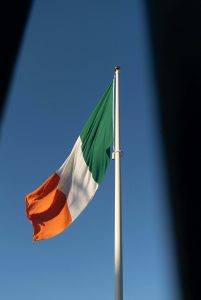
April 10 marked the 25th anniversary of the signing of the Good Friday Agreement. The accord brought an end to a 30-year cycle of sectarian violence that cost 3,500 lives, wounded thousands more, and left much of Northern Ireland locked in a perpetual state of unrest characterized by hopelessness and revenge. The final agreement ending the “Troubles” was the culmination of years-long negotiations brokered by the Irish and British governments, as well as nationalist and loyalist parties, with the support of the United States and able mediators led by former U.S. Senator George Mitchell.
The GFA, and subsequent agreements tied to it, included several key components: political power-sharing, disarmament (or decommissioning), human rights, security, and policing powers. Economic development was essential to showing a peace dividend. Perhaps most importantly, a vote was held in both the Republic of Ireland and Northern Ireland to demonstrate the people’s support for GFA. It passed overwhelmingly in both locales, 94% and 71% respectively. That said, the Protestant vote in Northern Ireland was 56%, a healthy majority but a sure sign of hesitancy about what the future held; at the time, Protestants, supporting continued unity with the United Kingdom, constituted a narrow majority of the overall population.
The GFA was a huge achievement, but reaching a political deal between the various factions in Northern Ireland was perhaps the easy part. The much more daunting challenge has been, and remains, creating a culture of peace between aggrieved people, who have suffered much, trust little, and cling to narratives which often impair an ability to see other points of view. Building trust is a long-term process which only starts when the guns grow silent and rhetoric moderates. Today, tension remains ever-present, and tranquility is often threatened by events, actions and developments beyond the immediate control of the players from Northern Ireland itself.
Despite the recent celebrations in Belfast, including a visit by President Biden, tension is rife. Still a part of the United Kingdom, Northern Ireland opposed Brexit. It benefited from trade with the Irish Republic, which remains steadfastly part of the European Union. The Brexit issue, and the British government’s attempt to implement a separate agreement pertaining to Northern Ireland, has exacerbated other stresses on GFA.
Moderate parties fared poorly in both the 2022 assembly and 2023 local elections. Nationalist (and predominately Catholic) Sinn Fein emerged as the majority party, while the loyalist Democratic Unionist Party secured the second largest vote. Both parties hold more hardline views than their respective nationalist and loyalist competitors. This does not necessarily mean they will work against the spirit of GFA, but the 90-member unicameral Northern Ireland Assembly – called Stormont – has not sat since the May 2022 election. Meanwhile facts on the ground change. Brexit is reality, and the 2022 census revealed a Catholic majority.
Concern is growing, which makes societal peace, and the work of civil society organizations, especially important. While few foresee a return to the Troubles, dark clouds loom.
Global Perspectives & International Initiatives is proud to partner with one heroic actor in the Northern Ireland peace process. Dr. Gary Mason, a Methodist Minister, worked with militants, particularly Protestant ex-combatant, as well as political officials, civil society leaders, and citizens of all stripes during the Good Friday process. His efforts led him to found Rethinking Conflict, an organization dedicated to peaceful conflict resolution among societies worldwide. An internationally recognized expert in this sphere, he has worked and collaborated with individuals and organizations in Israel, Palestine, South Africa, and the United States.
I would emphasize how much concern many non-Americans, including Dr. Mason, have about the acrimonious political discourse transpiring in the United States today.
GPII’s Dr. Ted Reynolds and Dr. Mason taught a Windows to the World at the Burnett Honors College last fall; a class which included participation, albeit online, from individuals who were directly involved in the Troubles – combatants, political leaders, and members of civil society. We seek to expand our efforts in this field to include curriculum, student engagement, and study abroad visits to Belfast, Dublin, and London – the locations where this conflict and its resolution took place and is still being implemented. Israelis and Palestinians, locked in their own seemingly endless conflict, will also participate – offering a unique comparative example. This exciting opportunity is supported by British and Irish universities, think tanks, political leaders, and others, and if we succeed will provide a one-of-a-kind experience for UCF students. Stay tuned as we move forward with this exciting project.